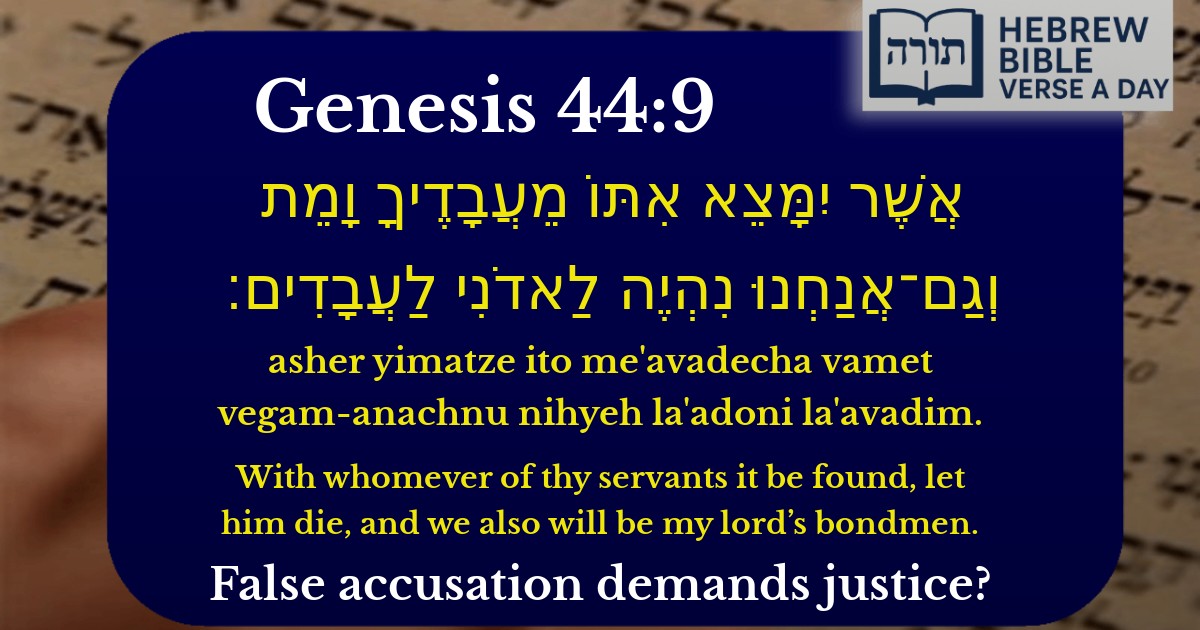Frequently Asked Questions
Q: What is the context of Genesis 44:9?
A: Genesis 44:9 is part of the story where Joseph's brothers unknowingly stand before him in Egypt. Joseph tests them by placing his silver goblet in Benjamin's sack and then accusing them of theft. In this verse, the brothers declare that if the goblet is found with any of them, that person should die, and the rest will become Joseph's slaves.
Q: Why did Joseph's brothers make such a strong statement in Genesis 44:9?
A: According to Rashi and other commentaries, the brothers were confident that none of them had stolen the goblet, so they spoke boldly. Their statement was meant to demonstrate their innocence and trust in their own integrity. However, this also set the stage for Joseph's test to see if they would stand by Benjamin as they had once failed to stand by him.
Q: What lesson can we learn from Genesis 44:9?
A: The verse teaches the importance of careful speech and the consequences of making absolute declarations. The brothers spoke hastily, not realizing the goblet was planted in Benjamin's sack. This reminds us to weigh our words carefully, as the Talmud (Pirkei Avot 1:11) advises, 'Say little and do much.'
Q: How does Genesis 44:9 relate to repentance (teshuvah)?
A: This moment is part of Joseph's plan to test whether his brothers had repented for selling him into slavery. Their willingness to stand by Benjamin—even at the cost of becoming slaves—showed their growth in responsibility and unity, key aspects of teshuvah (repentance) according to Jewish thought.
Q: Why did the brothers offer to become slaves in Genesis 44:9?
A: The Midrash explains that the brothers were demonstrating their commitment to justice and their willingness to accept collective responsibility. Unlike when they sold Joseph, they now showed unity and concern for Benjamin. This reflects the Jewish value of 'kol Yisrael areivim zeh lazeh'—all Jews are responsible for one another (Talmud, Shevuot 39a).


Context in the Torah
This verse (Bereshit 44:9) is part of the narrative where Yosef's brothers unknowingly stand before him in Egypt. Yosef, testing them, plants his silver goblet in Binyamin's sack and accuses them of theft. The brothers, unaware of the setup, declare this harsh penalty to demonstrate their confidence in their innocence.
Rashi's Commentary
Rashi explains that the brothers' statement was a conditional declaration ("im yimatzei" – if it is found) rather than an absolute decree. He notes that they did not actually impose a death penalty on themselves, but rather expressed their willingness to accept severe consequences if guilty. Rashi further comments that the phrase "we also will be my lord’s bondmen" indicates their collective responsibility—they would all share the punishment if one was found guilty.
Talmudic Insight (Shabbat 31a)
The Talmud discusses this verse in the context of middah k'neged middah (measure for measure). Since the brothers sold Yosef into slavery, they were now confronted with a situation where they might become slaves themselves. This reflects the divine principle that one's actions ultimately return to them.
Ibn Ezra's Perspective
Ibn Ezra observes that the brothers' extreme language ("let him die") was meant to emphatically prove their innocence. He suggests they spoke this way because they were certain no theft had occurred. Their willingness to accept such a severe consequence was a rhetorical device to convince Yosef of their honesty.
Midrashic Interpretation (Bereshit Rabbah 92:8)
The Midrash highlights the brothers' unity in this moment—they stood together in declaring this oath. However, it also notes the irony that their words would later cause distress when the goblet was "found" with Binyamin. This teaches that one must be cautious with words, as they can have unforeseen consequences.
Rambam's Ethical Lesson
In his discussion of repentance (Hilchot Teshuvah), Rambam derives from this episode the importance of carefully considering one's words before speaking. The brothers' rash declaration created a difficult situation that required divine intervention to resolve. This serves as a cautionary tale about the power of speech.